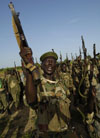
Violence from three separate uprisings in South Sudan in the past month have resulted in 87 people killed, said a spokesperson from the South Sudan army, or SPLA. This surprising cumulative death toll underscores the real potential for even disparate outbreaks of violence to have a destabilizing effect on the region as it approaches a crucial referendum vote in January. The army spokesperson claimed that the three rebellions—whose leaders have all expressed grievances toward April’s election results—are supported by Khartoum, in an attempt to undermine the secession vote.
According to the spokesperson, the bulk of casualties came from attacks by General George Athor’s forces, an army general who defected in early May with a group of soldiers and has clashed with the army several times. He remains in Jonglei state with his militia, as does another dissident group led by David Yauyau. The third group, led by Colonel Galwak Gai, is in Unity State.
If Khartoum does have a hand in these three uprisings, it would certainly not be the first time it has used proxy militias to achieve its aims. During the North-South civil war, it was common practice for the ruling regime to exploit the ethnic and political divisions in the region by providing material support to militia groups in the South and fueling intra-South fighting. Today, there remain deep political, military, and ethnic fissures that are vulnerable to similar interference—especially in the currently heated, post-electoral environment.
But violence is not the only means by which the referendum could be undermined. In a recent statement written by Athor, and reported on by Sudan Tribune, the rogue general argued that because the South’s ruling party, or SPLM, rigged the elections in the South, it could not be trusted to conduct a legitimate referendum vote early next year:
An illegitimate government that rigged the democratic right of the people cannot be trusted to lead the Southern Sudanese into a democratic exercise to determine their destiny.
While the SPLM may have had motivation to use intimidation and force during the April elections, it does not in the referendum. According to NDI focus groups conducted in 2009, the South Sudanese people, like its ruling elite, do want to secede from the North. The danger thus lies in how legitimate the referendum vote appears. In a region where there are few paved road, the odds of logistical delays and mistakes are high—as we saw during the April elections. It would not be surprising for Khartoum to seize on Athor’s line of argument as the referendum approaches.
With about six months left before the referendum and with the addition of intra-South violence to the list of many obstacles hampering a peaceful secession, there is an immediate need for high-level engagement in Sudan from international stakeholders.
Photo: SPLA in Abyei. (IRIN)

